Har du någonsin försökt öppna ett av dina WordPress-inlägg och mötts av ett 404-fel? Ibland upplever vi det när vi arbetar på våra egna WordPress-webbplatser eller hjälper våra användare
Detta fel uppstår när du kan komma åt ditt WordPress-adminområde och din blogg, men när du försöker öppna ett specifikt inlägg möts du av ett “404 Not Found”-meddelande.
Det kan vara frustrerande att se ditt innehåll till synes försvinna, men vi har hittat några lösningar för att åtgärda detta problem. I den här kompletta guiden visar vi dig hur du åtgärdar WordPress-inlägg som returnerar 404-fel.
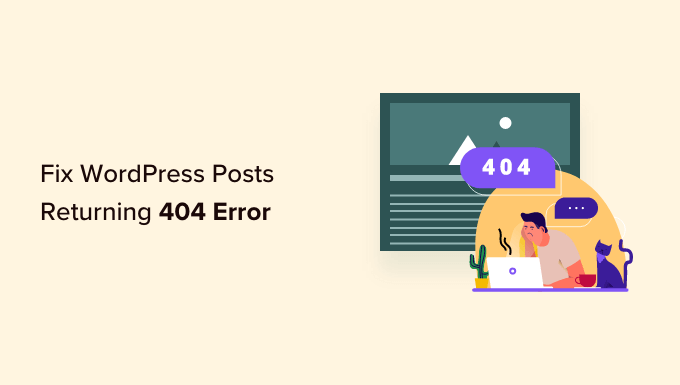
Varför returnerar mina WordPress-poster ett 404 error?
Det finns flera anledningar till att dina inlägg kan visa ett 404-fel “Sidan hittades inte” i WordPress. Dessa kan inkludera:
- Konflikter med plugin eller theme: Ibland kan tillägg eller teman som du har installerat på din site störa hur WordPress hanterar permalänkar. Detta kan leda till brutna links och 404 error.
- Problem med customize-kod: Om du har addat custom code till din website kan det finnas error i koden som påverkar permalänkar eller orsakar andra konflikter, vilket resulterar i 404-fel för dina posts.
- Problem med din .htaccess-fil: Filen .htaccess spelar en roll för hur WordPress strukturerar webbadresser. Om den här filen är skadad eller saknas kan det leda till 404-fel för dina inlägg eller sidor.
Så här hittar du alla WordPress-inlägg med 404-fel
Innan vi går in på lösningarna vore det bra att ta reda på om det här felet bara inträffar i ett eller två inlägg eller i flera inlägg. På så sätt kan du bestämma omfattningen av problemet och välja den lämpligaste lösningen.
Ett enkelt sätt att ta reda på detta är att använda Google Search Console. Om du inte redan har skickat in din webbplats till Google Search Console kan du läsa vår guide om hur du lägger till din WordPress-webbplats i Google Search Console.
När Google-boten har genomsökt och indexerat din webbplats kommer Google Search Console att ge dig detaljerad information om webbplatsens prestanda, inklusive eventuella 404-fel som den stöter på.
För att ta reda på vilka inlägg som returnerar 404-fel kan du logga in på Search Console-panelen. Navigera sedan till rapporten “Pages”, så ser du en detaljerad lista över alla fel.
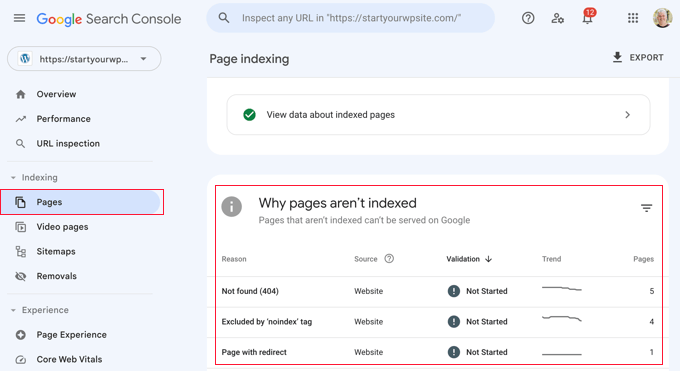
Om du vill ha mer information kan du läsa vår lista med tips om hur du använder Google Search Console för att öka trafiken på webbplatsen, som innehåller några tips om hur du åtgärdar 404-fel med verktyget.
Med detta sagt, låt oss titta på hur man fixar WordPress posts som returnerar 404 error. Du kan använda länkarna under för att hoppa direkt till olika lösningar:
Har du inte tid att åtgärda 404-fel själv? WPBeginner Pro Services kan hjälpa dig! Med vår prisvärda Emergency WordPress Support kan du anlita experter för att åtgärda 404-fel, brutna länkar, omdirigeringsproblem och mycket mer. Sluta stressa över WordPress-problem och få dem fixade! Schemalägg akut WordPress-supporttjänster idag!
Metod 1: Kontrollera för Plugin eller Theme Conflicts och Custom Code Issues
Ibland kan plugins, teman eller anpassad kod som du har lagt till på din WordPress-webbplats störa permalänkar eller orsaka konflikter, vilket leder till 404-fel. Vi har till och med upplevt det själva när vi testar verktyg på vår demosajt.
Ett sätt att lösa detta problem är att tillfälligt deactivate tillägg. Tillägg kan ibland störa hur WordPress hanterar links.
När du har deaktiverat plugin-programmen kan du reaktivera dem ett efter ett och samtidigt kontrollera om 404 error återkommer efter att du har aktiverat varje plugin. Om error dyker upp efter att ett specifikt tillägg aktiverats kan det vara den skyldige.
Du kan sedan göra en snabb Google-sökning efter lösningar relaterade till det plugin-programmet eller kontakta plugin-utvecklaren för support.
På samma sätt kan ditt WordPress theme orsaka konflikten.
För att kontrollera kan du tillfälligt byta till ett standardtema för WordPress som gillar Twenty Twenty-Three eller Twenty Twenty-Four. Allt du behöver göra är att gå till Appearance “ Themes och klicka på “Activate” på ett standardtema.

Om 404 error försvinner med standardtemat tyder det på en potentiell konflikt med ditt nuvarande tema. Du kan då försöka felsöka temat eller överväga att använda ett annat tema.
Du kan kontrollera vårt expertval av de mest populära WordPress teman för rekommendationer.
Om du senaste har infogat code snippets på din website kan det finnas error i koden som orsakar 404-felen. Ta en close titt på koden som du har add to och se om du kan identifiera några misstag.
Det säkraste sättet att add to code snippets till WordPress är med WPCode plugin. Detta plugin låter dig insert custom kod utan att direkt arbeta med theme-filer, vilket minskar risken för att bryta din website.
Dessutom, när WPCode upptäcker ett error i din kod, kommer det automatiskt att deactivate snippet och be dig att kontrollera det. Du kan också använda testläget för att kontrollera om din kod fungerar innan du skickar den till din live website.
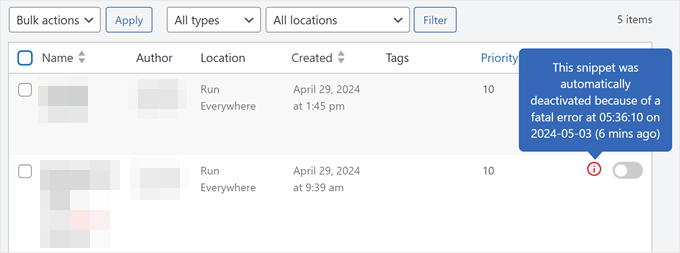
Om ingen av dessa lösningar fungerar, gå vidare till nästa metod där vi troubleshootar dina permalänk-inställningar.
Metod 2: Fixa dina permalänk-inställningar
WordPress-poster kan returnera 404 error på grund av problem med omskrivningsregler i din .htaccess-fil. I de flesta fall kan du fixa problemet genom att updating dina permalänk-inställningar.
Gå bara till Settings ” Permalinks i din WordPress-admin och klicka på knappen “Save Changes”.
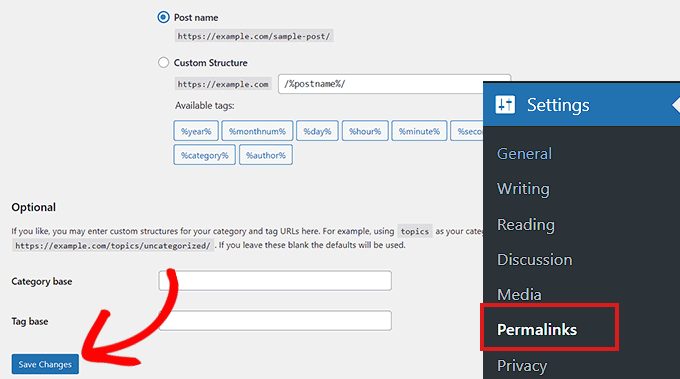
Det finns inget behov av att göra ändringar i själva inställningarna för permalänken. This will update your permalänk settings and flush the rewrite rules.
I de flesta fall fixar den här lösningen WordPress posts 404 error. Men om det inte fungerar för dig, behöver du förmodligen updating din .htaccess-fil manuellt.
Metod 3: Update av .htaccess-filen i WordPress
Innan du börjar, se till att säkerhetskopiera din WordPress.htaccess-fil först. Om något går fel kan du enkelt återställa originalfilen.
Nu måste du ansluta till din server med hjälp av en FTP-klient som FileZilla eller File Manager-appen i din WordPress dashboard.
Därefter måste du hitta och redigera .htaccess-filen, som ligger på samma location som foldrar som gillar /wp-content/ och /wp-includes/.
Högerklicka bara på filen och välj “File permissions”.
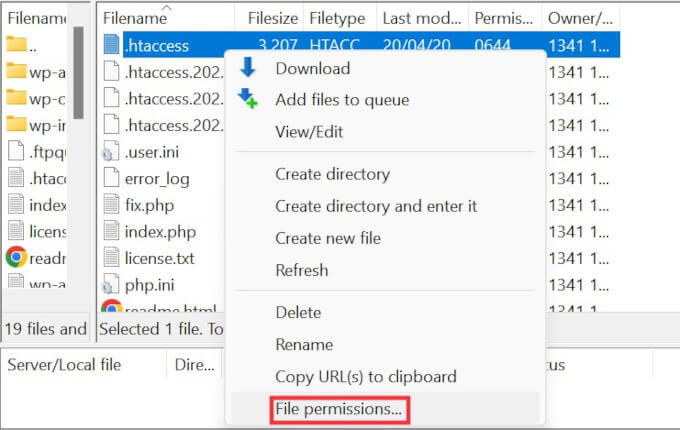
Du kan göra filen skrivbar genom att ändra dess behörighet till 666.
Du behöver bara enter “666” i boxen “Numeric value” och sedan clicka på “OK”.
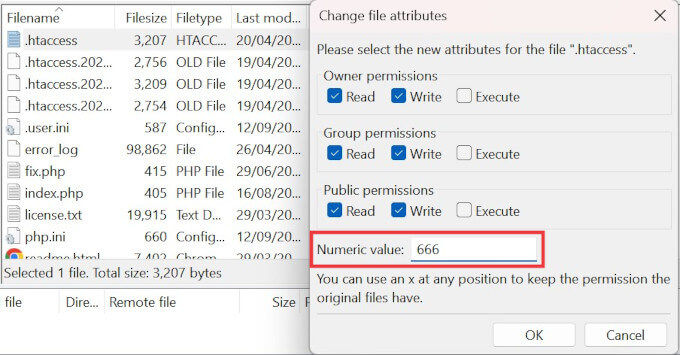
Sedan måste du upprepa stegen i den första metoden i vår tutorial. När du har gjort detta, glöm inte att ändra behörigheterna tillbaka till 660.
You can also edit the file and add code to it.
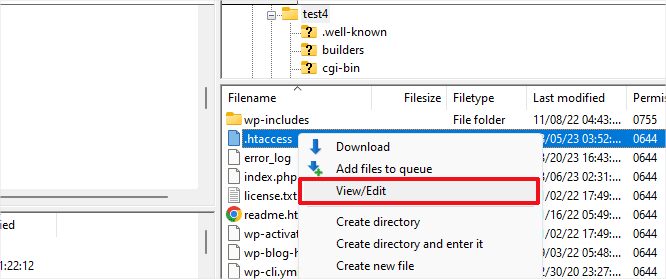
När du har öppnat .htaccess-filen med en textredigerare infogar du helt enkelt den här koden:
1 2 3 4 5 6 7 8 9 10 | # BEGIN WordPress<IfModule mod_rewrite.c>RewriteEngine OnRewriteBase /RewriteRule ^index\.php$ - [L]RewriteCond %{REQUEST_FILENAME} !-fRewriteCond %{REQUEST_FILENAME} !-dRewriteRule . /index.php [L]</IfModule># END WordPress |
Metod 4: Kontakta din hosting provider
Om ingen av lösningarna ovan har fixat WordPress-poster som returnerar 404 error, rekommenderar vi att du kontaktar din WordPress hosting provider. Det kan finnas ett error hos dem, eller så kanske de kan hjälpa dig att troubleshoota problemet.
Vänligen se även vår guide om hur du ber om support för WordPress på rätt sätt och hur du får det.
Metod 5: Aktivera mod-rewrite (lokal WordPress-installation)
Om du använder en lokal server för teständamål måste du aktivera mod_rewrite i Apache-konfigurationen på din MAMP-, WAMP- eller XAMPP-webbplats.
This will allow WordPress to generate clean URLs and prevent the 404 error for posts and pages on your local server.
Hur du gör detta skiljer sig åt beroende på vilken plattform du använder. Personer som använder XAMPP kan öppna sin panel och klicka på knappen “Config” inom Actions. Välj sedan “Apache (httpd.conf)”.
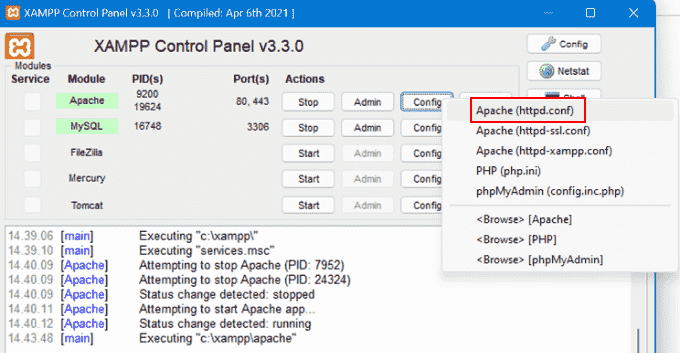
Därefter måste du hitta den här raden #LoadModule rewrite_module modules/mod_rewrite.so och remove ‘#’ för att avkommentera den.
Detta kommer att hämta mod_rewrite.
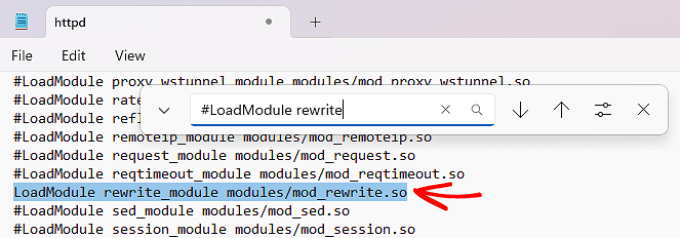
Hitta sedan alla instanser av AllowOverride None och ändra dem till AllowOverride All.
Värdet “All” innebär att alla direktiv kan åsidosättas.
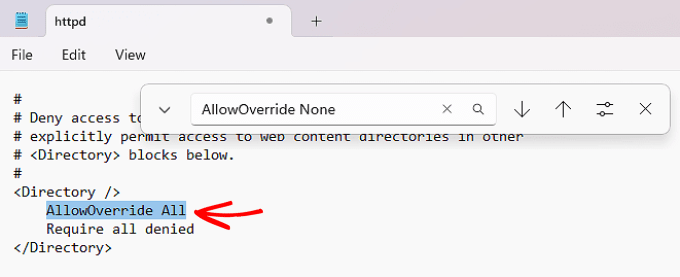
När du är klar kan du save filen httpd.conf och close den. Därefter klickar du på “Stop” på Apache-modulen i XAMPP:s kontrollpanel och på “Start” igen för att starta om den.
Gå sedan tillbaka till din adminpanel för att se om dina permalänkar fungerar.
Video Tutorial
Om du behöver visuella instruktioner är det bara att titta på videon nedan.
Vi hoppas att den här artikeln hjälpte dig att lösa inläggen som returnerar 404-fel i WordPress. Du kanske också vill se vår guide till de vanligaste WordPress-felen och hur du åtgärdar dem, tillsammans med våra expertval för de bästa WordPress-pluginsen för att utveckla din webbplats.
If you liked this article, then please subscribe to our YouTube Channel for WordPress video tutorials. You can also find us on Twitter and Facebook.





Abs
It helps.. just on permalink, already fix my error..
Thanks for this article..
Julius
Mine is a little different. All the pages are working fine but I get “page not found” when working in some places in the dashboard. Let’s say for example I’m creating a new page from the dashboard. When I click on publish I get a 404 error.
And I’ve tried everything above but it’s not working.
Iron65
Thanks for the tip!! the permalink really saved me!!! In case if any other suffered this by updating Yoast SEO or by just deleting cache, try that one, it will fix it
Monica
I have been trying to fix this permalink issue in my site for months and now I did it with your instructions. I don’t know why I did everything you said already and after writing the 644 permissions to fix the httaccess file, it went back to non-writeable. Now I did it and fixed the permissions and wrote your code and it worked. i really don’t know which was the difference but this time it did. Maybe that I already fixed the httaccess in the original folder where I have a subfolder with my blog. That is the only thing I did differently. Thanks a lot
Rais Dar
I am getting a 404(page not found) on my site. What should i do as i tried your methods but still error persists
Chetan
I had faced the same kind of problem. I used to get 404 Page Not Found error for a page. But the reason was that I and used a permalink slug that was associated with some default page in WordPress. e.g. http://example.com/posts – This is WRONG. Because I cannot use ‘posts’ as permalink slug. It is already reserved for some WordPress page. When I changed it to ‘my-posts’, so that now my permalink read: http://example.com/my-posts, the error was gone!
md
hi ,
i had same htaccess .,however , i delete it and import new one but still same .
dumb
hay guys ….
when i change the permalink to anything other than default, my pages wont work i get this error message
“The requested URL /wordpress/home/ was not found on this server.
Apache/2.4.9 (Win64) PHP/5.5.12 Server at localhost Port 80”
pl help me out
Ian Scofield
I just had this with one of my websites. All of my posts worked fine except for one though. Something was bad about the URL. I had to change the post URL.
neelesh
thanks a lot… ur website has helped me a lot of times and u guys are doing great job. i cant resist myself from thanking you…..
Hardik
Hi Wpbeginner,
Actually I just have migrated from hostinger to one of paid hosting. After migration all things are going good. But when I have tried to edit one my post it regularly shows the following error.
“Page not found error” ‘Apologies, but the page you requested could not be found. Perhaps searching will help.
When I have landed here I have tried all the solutions which you have share.
But nothing is working for me.
Please Help.
Thanks in advance
Hardik
Adrienne
Question? I have an url site, but the data is all new. so there are about 100 old posts that are not longer valid but linked to other sites.. How do I change it to forward to main website, so that Google Search Console can update they crawl records.
I’m looking, but I don’t see anything for posts that have been deleted and getting a 404 error.
Thanks,
David
Thanks was having exactly that issue and this fixed it perfectly!
Mark
Thank you! So nice to find such an easy fix for such a frustrating mysterious problem.
Xavier
Woohoo! Thanks for this. I thought my site content had gone to the birds. Doing the permalink “Save Changes” worked instantly for me.
Pablo
What if it doesn’t work no matter what you do?
HELP!
Fida
Hi Pablo Which server do you use? Shared server or VPS?
Steve Jackson
Thank you for this tip, it was a lifesaver and worked perfectly!
John
Thank you !!!!
abhishek
thank you very much it saved my links pretty well
Hugo Nascimento
Hello guys,
I have the same issue with a client blog. i’m trying to build a custom form inside post page and when I enable the custom permalinks, the form cannot be accessed.
When I change permalinks to default, it works out! :/
Really strange. :/
Sarah
Changing permalinks to default solved my problem too! Thank you!
mojamalenkost
Thank you so much!!!
victor
I have this problem .I can’t login to my WordPress dashboard, each time I try to it keeps giving me Error 404 not found. please help me fix this.
Dont Ask Real Name
Your tip was a life saver. All our posts were just not visible. Your tip helped a lot.
What i did:
Updated .htaccess set CHMOD to 666 instead of 660
Clicked – > Settings -> Permalinks
Clicked on Defaults and clicked Save Changes
Again,
Clicked on Post name and clicked on Save Changes. (since i used custom url that’s why)
You just saved me a ton of headache…
Clive Wales
That was a real life-saver – thought I’d totally screwed up a replacement site I’ve been working on, after trying to be clever with an .htaccess redirection. Thank you!
Marko Liuksiala
Great, that worked – thank you!!
Bill
I like the permalink structure of my posts and they seem to work. I have been using the same structure for several years.
However when I go to Settings–>Permalinks the actual structure is not even listed as one of the options available anymore.
Is this a problem?
Emily
Hi I am having this problem and to be honest, I feel sick because I don’t know what to do. I am a novice really and scared I am going to kill my website more than I already have.
Can someone please tell me what my custom permalink should look like and what I SHOULD hav in my .htaacess file? Right now it seems blank?
WPBeginner Support
Go to Settings » Permalinks choose a permalink structure that you like and then save your changes. Open your .htaccess file and you will notice that WordPress has automatically updated it. If it is blank and your chosen permalink structure is not working, then you can manually add this code into your .htaccess file:
# BEGIN WordPress
RewriteEngine On
RewriteBase /
RewriteRule ^index\.php$ – [L]
RewriteCond %{REQUEST_FILENAME} !-f
RewriteCond %{REQUEST_FILENAME} !-d
RewriteRule . /index.php [L]
# END WordPress
Admin
Viktor
Yes, that was the solution! Thanks a lot. My hosting service changed these settings as I changed the URL to custom error pages but just clicking on the permalink settings fixed that.
Matthew Shelton
“Go to Settings » Permalinks, and simply click on Save Changes button” – fantastic, that worked right away – thanks a lot!!
WPBeginner Staff
Check the .htaccess file.
Gretchen Louise
What about for a single post permalink that got changed and somehow created an internal redirect, and now it cannot be changed back without creating a 404 error? Trying to troubleshoot an issue for a client and wondering where those internal redirects are stored and where in the world to clear them. Thank you.
Thembi Ngema
Dudessss. You guys are legends :)…. Must say I have learnt a lot from you in the past week
bhupendra
hi
thanks I just updated parmalinks structure and site started working
Arpee Lazaro
i just updated t he permalink structures are pictured in this solution and it worked like a charm. thanks!
WPBeginner Staff
Please contact your web host.
Attiq Haroon
I tried the solutions you mentioned in you post bhut it didn’t seems to be working. What happened actually is that I wanted to add a rule to .htaccess file so I downloaded that files from FTP and edited it and uploaded that file again replacing the original one, and then the problem popped up. I have tried a couple of fixes such as deleting and putting new .htacces with default code, removing .htacces file, etc. The only fix that is making the posts accessible is to set the permalink to default option. This makes the posts to work but it can not be a permanent Fix as it is not recommended as an SEO prespective
Please try to find a working solution on that problem
WPBeginner Staff
backup your .htaccess file. Then delete the one from your server. Now log into WordPress admin area and go to Settings -> Permalinks choose your desired permalink structure and hit save changes.
After that connect to FTP and see if WordPress has created a new .htaccess file and it is not blank.
Attiq Haroon
I tried that solution, It created a .htaccess file which looks fine but doesn’t work.
gui
If you have Yoast WordPress SEO or any SEO plugin installed, check your SEO permalink section…
Tim Topham
Hey guys – I recently received an email from Google crawl as I suddenly had a heap 500+ of lost links. It seems that at some stage I must have changed the permalink structure so that lots of the links on old posts have the post date and then post name where as they now just have the post name.
Before I go mad trying to fix 500 links in my articles manually, is there an easy way to update the hyperlinks in articles when this sort of thing happens?
Cheers,
Tim.
Manuel Moreira
I was going insane with this 404 thing after a server move. Thanks for the help guys.
Cindy
thank you! My sites were hacked and all internal pages showed a 404 error. saving the permalink settings fixed it! cheers!
Joe Cutroni
Hi all, I’ve scoured the web to find help to resolve my issue, but
for the life of me cannot get anything to work. Starting just a couple
of weeks ago, all of my back end pages (home page was fine) started
turning out 404 errors on them.
The permalink that I have always used is “Custom structure” (/%category%/%postname%/)…here are some things that I’ve tried:
1 . Gone into my permalinks, clicked “save settings”, and that method provides a temporary fix, maybe for an hour or two, then the 404 errors return on all secondary pages. I’ve also set my permalinks to a different option, such as “Default”, but still get 404 errors shortly after.
2. Completely deleted my htaccess.php file, then went back and saved permalink settings…less than an hour later, 404 errors returned.
3. Commented out this line of code in my function.php file, also completely removed it altogether:
“$wp_rewrite->flush_rules();”. That didn’t do anything. I’ve tried
using both “//” and “#” before it and tested…still get 404 errors.
4. De-activated all of my plugins to see it one of them was the culprit,
but after a short time, my 404 errors resumed while none of the plugins were active.
Like I said, this issue just start a few weeks ago. I use Securi
Security and had them scan my site for any malware, etc…and the site
is clean.
Can someone PLEASE help me with this? Would bigtime appreciate it!
Kyle
Hey Joe,
Did you ever find a workable solution for this? I’ve gone through the same issues that you listed.
David
Hey Guys!
Did you find a solution to the returning 404-error as listed above by JOE CUTRONI?
I’m dealing with the same issue?
Some Feedback would be awesome!
Thank you!
Greetings from Germany,
David
Paul
Hey guys,
you are likely to have a virus on your site.
good luck
Paul
Katie
This is the problem I am having. I moved from WordPress.com to .org and I am at my wits end. I understand the directions that say got admin—> settings —> permalinks. In fact, I remember when I was setting this up that I messed with that particular setting. Here’s my issues: WHERE do I find this admin–> settings–> permalinks?? Is it on my host, in the cpanel? Is it back on WP.com, or if it’s WP.org? And if it’s on WP.org I don’t have a clue how to get to all the admin features of my blog now. When I log in, it shows me my personal profile and allows me to edit it. But not any blog administration. I am at a loss and really losing my head.
Gabriel
If I’m understanding you correctly, just type in the domain name that you activated the wp.org tool and follow it up with “/wp-admin” (for instance “www.example.com/wp-admin”)log in and on the lower left hand side you would find the settings option.
mali suresh
how can change localhost paramalink step by step help me
Srihari K
I had the same problem.. adding the below line in httpd.conf and restarting apache fixed it.
Options +FollowSymLinks
Kym Penrose Clayton
Thank you thank you thank you
Iris Fritschi-Cussens
THANK YOU from the bottom of my heart! I had to delete my .htaccess file due to a hack and then just when I thought everything was fine again nothing worked apart from the home page. Pressing Save Changes on the permalinks solved it in one.
disqus_Hct2NXneXJ
Thanks Man. The Permalink Solution Fixed my Problem. Thanks & Cheers for You!
MEMEME
Thanks! You are God.
L
thanks! I was close to panic…
Thai
Thanks for the post! But sadly I tried these with on the local and nothing worked.. Any other tips?
SemLavana
Thank you. Saved my weekend!